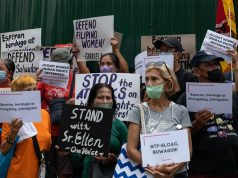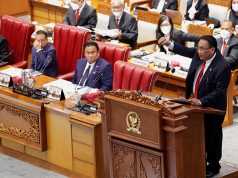MANILA, Philippines — In the teeming Quezon City jail, Rody Lacanilao, an inmate for 18 months, says he prays for clear weather at night.
A downpour, he says, will prevent him and hundreds of fellow prisoners from sleeping on plywood mats in an outdoor hallway. The cells themselves are overflowing with an influx of detainees from President Rodrigo Duterte’s yearlong war on drugs.
Thousands of people have been killed in Duterte’s campaign, mainly drug users and small-time peddlers. Tens of thousands of others have been thrown into jail, and both prisons and courts in the Southeast Asian nation are creaking under the pressure.
“Since the war on drugs started, it became harder to sleep,” Lacanilao told a Reuters team allowed access to the Quezon City jail. “We have no place to go to when it rains.”
The 37-year-old is facing trial on a drugs charge.
The prison was initially built for 262 inmates, but now has 2,975, three-quarters of them jailed for drug-related offences.
At night, its basketball court, chapel, classrooms and walkways become sleeping areas for detainees.
Inmates who spoke to Reuters said living conditions were unbearable, made worse by the prospect that it could be years before their trials are decided. Many of them are not eligible for bail or cannot afford to pay the bond.
“Prisoners came in one after the other. If you have money, you can buy a spot in the sleeping quarters,” said Junjun Vallecer, who says he has been in the jail for four years for possession of drugs but is still being tried. He says he has to wait four to six months between court appearances.
The Bureau of Jail Management and Penology put the prison population in the country, both those under trial and convicts, at 137,417 as of the end of June, up 22 percent since Duterte took office at the end of June last year.
Police and the Philippine Drug Enforcement Agency arrested 96,703 suspected pushers, users and chemists from July last year until earlier this month, according to police data. A staggering 94 percent of people jailed for drug offenses are still being tried, according to BJMP.
Police in Metro Manila arrest nearly 100 drug suspects each day, says National Capital Region Police Office director Oscar Albayalde.
“Whether they are minor charges or not, we have to arrest these people,” Albayalde told Reuters. “We make these arrests that contribute to the over-congestion of the detention cells … but what can we do?”
Overcrowded jails, overflowing courts
Including a backlog, the BJMP says 303,534 narcotics cases were at trial or being processed as of June.
Most of the cases are defended by the Public Attorney’s Office, a legal aid agency attached to the Department of Justice. At the end of 2016, the agency had a backlog of 303,000 drugs cases, compared to about 82,000 at the end of June 2016, just before Duterte unleashed his fierce anti-drugs campaign.
The agency says it has 1,665 lawyers to handle a total of 709,128 criminal cases currently pending, meaning an average of 426 cases for each of them.
“We have tons of work,” said public defender Karen Jay Sabugo, eating a meal of instant noodles at her desk. “There are times when I return to the office so exhausted that I can’t speak with colleagues anymore.”
The 30-year-old, in her first year as a trial lawyer, told Reuters she attends more than a dozen court hearings a day.
“In the morning, we attend court hearings and in the afternoon, we prepare pleadings and meet clients. I go to jails to prepare our defense.”
Boxloads of documents are piled up inside the PAO’s office in Quezon City. Most are related to cases, but some are applications for about 750 new positions the government has agreed to create in the agency in the next two years to handle the overflow of cases.
Typically, trials in the Philippines begin some years after arrest, said Maria Socorro Diokno, executive director of the Free Legal Assistance Group, an organization of human rights lawyers. Trial last two to three years on average in regional courts, and another two or three years are taken up by appeals.
Even before Duterte’s anti-drugs crackdown, the Philippines had the third-most-congested prison system in the world after Haiti and El Salvador, according to the London-based Institute for Criminal Policy Research.
An average of six inmates occupy 4.7 square meters, the space intended for one prisoner, data from the BJMP showed.
One prison officer watches over 63 prisoners on average, far from the stipulated one-to-seven ratio, and there are insufficient numbers of guards to escort suspects to court hearings, the data showed.
“The ratios are really wild,” said Martin Perfecto, deputy director of the Bureau of Corrections.
FLAG lawyer Alex Padilla says judicial reform is not a priority in the Philippines because there is scant sympathy for those accused of crimes. Duterte is extremely popular because people are fed up with crime and many support the killings in his campaign, he said.
“Judicial reform is the last reform because it’s dirty,” Padilla said. “These are criminals … they are the garbage of the society.”










